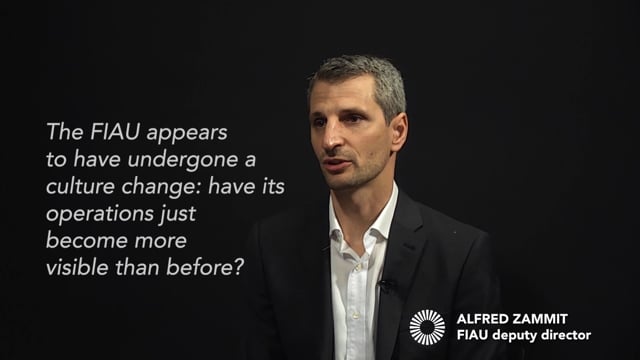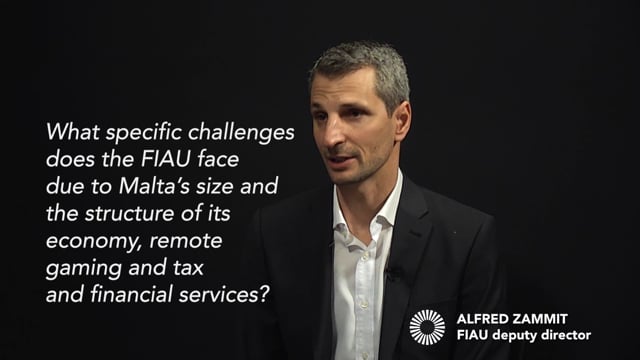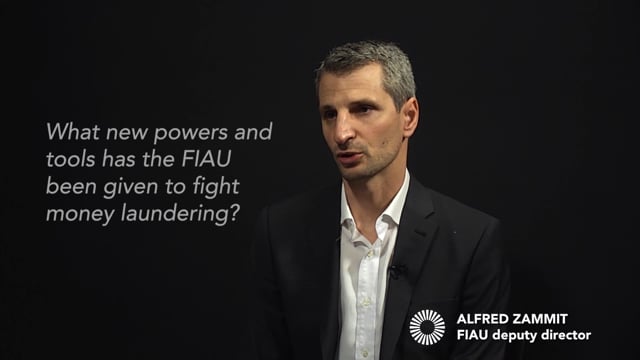Transformational overhaul takes the FIAU out of the red and into the black
FIAU Director Kenneth Farrugia and Deputy Director Alfred Zammit speak on the transformational overhaul at the Financial Intelligence Analysis Unit

The recent hefty increase in the Financial Intelligence Analysis Unit’s budgetary allocation in the wake of a number of well-documented financial and money laundering scandals that shook the nation’s political and economic structures has seen the Unit move, from a reputational standpoint at least, from the figurative red and into the black over a relatively short span of time.
The changes at the Unit, however, are far from cosmetic and have yielded tangible results on the ground, and businesses dealing with subject persons in terms of anti-money laundering and counter terrorism funding are being reached out to now more than ever.

MaltaToday earlier this week spoke with FIAU Director Kenneth Farrugia and Deputy Director Alfred Zammit, who both take a certain sense of pride in how their team - after four years of intense overhaul - managed to implement a vast amount of recommendations and action points from the European Banking Authority, Moneyval and others. Not only that, but they have also earned a newfound respect from the same international bodies and that had previously been dogging them.
Farrugia elaborates, “If you take the European Banking Authority as an example, they are fully aware of the changes made to the FIAU’s supervisory and enforcement processes, since regular liaison had been maintained while the FIAU was taking action to implement the EBA’s recommendations in 2018.
“The FIAU has overhauled its supervisory and enforcement policies and procedures to ensure it has addressed all the recommendations. Today, we are proud to say that we have a fantastic working relationship with the EBA and we value their support and contribution in raising anti-money laundering standards across the EU.
“We have been invited by them to participate in panel discussions and in training events, and we have also participated in projects and working groups led by the EBA on specific anti-money laundering topics.”
Following the FIAU’s actions on the EBA recommendations, Farrugia says, “We now have in place one of the best risk-based supervisory mechanisms in the European Union and beyond - so much so that we are being asked by the authorities of other countries to walk them through the changes we have implemented so they can learn from our experiences and, in turn, improve their own supervisory mechanisms and systems.”
An operational transformation
Indeed, the operational transformation has been significant. Zammit, who joined the FIAU in 2010 when it had just 10 employees, has seen the staff complement grow to over 100 today.
“There were a number of different factors catalysing this change,” he explains. “The government has become more sensitive to the need to increase resources and to have strong authorities in place to be able to fight financial crime in Malta, and to ensure that all subject persons in are monitored and compliant with their obligations.

“We have not only increased our resources but we have invested in our people by making sure they get the training they need. We have invested in tools, in information technology systems, and we have strengthened our policies and procedures across the board. As for the results, all in all, the FIAU has become more effective in carrying out its functions.
“This has led to an improved level of compliance by subject persons in Malta, and to an increase in the use of financial intelligence by the Police and other authorities in and outside Malta.”
Businesses reporting more suspicious transactions than ever
This, according to Zammit, is yielding tangible results on the ground, with the FIAU receiving and processing more suspicious reports than ever before.
The Unit last year, in fact, received over 5,000 suspicious transaction reports from subject persons in Malta, such banks and remote gaming companies. After analysis, it shared more than 170 analytical reports with the Police in Malta, and over 4,000 intelligence reports with its foreign counterparts.
“Also,” Zammit adds, “the FIAU has considerably increased its supervisory coverage by carrying out onsite or virtual examinations of subject persons, particularly in higher-risk sectors.
“In fact, last year more than 200 examinations were conducted using the FIAU’s recently overhauled risk-based approach. This, in turn, has resulted in more enforcement actions taken by the FIAU, such as the imposition of penalties or requiring subject persons to remediate their shortcomings within a specified period of time.”
Stakeholders embracing compliance culture
The marked surge in STRs, the increased compliance levels and the overall change being noted in the compliance culture among subject persons, Farrugia explains, ”are not only the result of the FIAU’s efforts, but it is also because these considerations are being embraced more and more by all the stakeholders.
“The subject persons themselves are investing heavily and are beefing up their resources and compliance systems. They are ensuring they are performing all the checks required, which is also triggering an increase in STRs. The more checks being carried out by the subject persons, the more suspicious reports are submitted, and this has been seen across all sectors.
But the size and structure of Malta’s business activity, and a seemingly constant entrepreneurial spirit, present advantages and challenges alike for the FIAU.
As Zammit notes, “Malta’s economy and subject persons are dynamic and quick to respond to business opportunities. One of our main challenges as supervisors and as an intelligence agency is to ensure we keep pace and abreast with the changes taking place in the sectors that we supervise, such as the developments of new niche markets, products or services.”
“Actually, the size of the country presents several inherent advantages. For example, the number of subject persons in Malta, which presently stands at just under 2,500, is manageable.
“We are well-positioned to reach out, communicate and assist subject persons to understand their obligations and how to implement them in practice.
“The physical size of the country and our institutional framework also greatly facilitates cooperation and coordination among the competent authorities of Malta both on policy and operational matters.”
Authorities ‘conducting duties and taking action’
While businesses dealing with subject persons and suspicious transactions are undoubtedly well-versed in the work of the FIAU, it hasn’t always been the case with the public at large.
Farrugia adds, “We are seeing that people are more aware of the implications of money laundering and of the FIAU’s work. If you were to have asked about awareness of the FIAU six years ago, a lot of people would not have known anything about the Unit. But today, this is no longer the case and there’s a lot more awareness of who we are and what we do.
“Also, from the perspectives of the authorities concerned – such as us at the FIAU, the Malta Financial Services Authority, the Malta Gaming Authority, the Police, Attorney General’s office, and the Sanctions Monitoring Board – they are conducting their duties thoroughly and are taking action.
“Coupled with that, there has been increased attention, at an international level, on the topic of money laundering and financing of terrorism. Everyone is taking the topic more seriously, as it is becoming increasingly clear how widespread and global the money laundering phenomenon is.”
Educational campaign on the €10,000 cash limit law
The newly-legislated cash restriction law, which imposes a €10,000 cash limit on the payment of goods, will undoubtedly have an effect on businesses dealing in high-end goods, and to this end the FIAU is about to embark on a campaign to educate Malta’s cash-intensive economy about the new law.

Zammit explains, “Speaking of the cash restriction law, there are different reasons why it was implemented. Not only was it one of Moneyval’s recommendations to consider introducing a mechanism to address the money laundering risks of use of cash in Malta, but Malta’s cash-intensive economy meant that the country needs to ensure that any associated money laundering risks are adequately mitigated.
“As such, having this law in place simultaneously helps in the fight against tax evasion and money laundering in cases where proceeds of crime in the form of cash need to laundered.
“This law itself should serve as a deterrent and reduce the excessive use of cash in Malta now that, as a first step, the law is in place. As a second step, the FIAU shall be embarking on an educational and an awareness raising campaign to inform the public of the recently enacted law, what it means to them and what the repercussions could be if one were to break the law. The FIAU is resourcing its newly set up Cash Restriction Section that will be responsible for enforcing this law on the ground.”

.png)



















